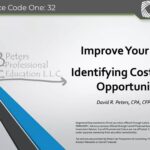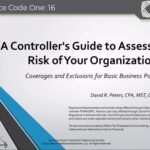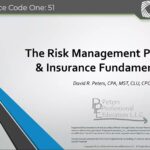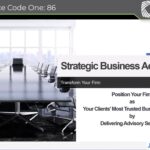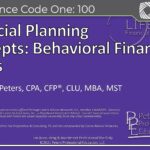Financial statements are a window into what is going on in the day-to-day operations of the company. They help us see what the company’s strengths and weaknesses are. However, financial statements can often have different messages depending on the user. Discussion Leader: David Peters
Improving Your Profits- Identifying Cost Cutting Opportunities (LIMG08/24)
Part of one’s duty as a CPA working in industry is to safeguard the assets of the organization. Cost cutting is one way to preserve assets and maintain a company’s competitive position in the industry. However, what keeps us from ridding our organizations of unnecessary costs? In this course, we will look at the factors that prevent our companies from being as streamlined as they could be. By using statistics and survey data, we will attempt to show how to better negotiate and navigate budgeting, and contracting decisions. We will also discuss financial statement analysis techniques, benchmarking, and cash flow management in an effort to better cut costs and maintain the long-run viability of an organization. Discussion Leader: David Peters
How To Be a Better CFO (LIMG07/24)
Gone are the days in which the CFO was just in charge of keeping the books. Today’s CFOs are involved in all parts of a company’s operations. Utilizing case studies, research, and discussion questions, this course will explore how to look at topics such as: picking out the best retirement plan, managing remote employees, strategic forecasting, and managing the budgeting process through the lens of a CFO. Discussion Leader: David Peters
Controller’s Guide to Assessing the Risk of Your Organization – Coverages and Exclusions for Basic Business Policies (LIMG06/24)
Part of being a CFO or Controller is protecting the assets of the organization and managing risk. While many financial leaders feel comfortable with the strategic aspect of this task, finding the right insurance coverages can leave one feeling out of their element. This course will focus on three common business policies: the package policy, the business & property policy, and the cyber policy. Through case studies and illustrative examples, we will explore what these policies cover, as well as what they don’t cover. We will also discuss how to have more productive conversations with outside insurance brokers. Discussion Leader: David Peters
The Risk Management Process (LIMG05/24)
Whether you are new to the risk management process or you are a seasoned pro, it always comes back to the fundamentals. Just like any other industry, insurance professionals have their own language. Through plain language and a commonsense approach, this course explores the steps involved in the risk management process, the elements of a good risk register, as well as what sections make up a standard insurance policy. Whether you are an insurance professional trying to brush up or you are simply trying to better understand the terms in your insurance policy, this course provides a solid foundation for understanding risk management. Discussion Leader: David Peters
How Much is My Business Really Worth? Exploring Business Valuation Fundamentals (LIMG04/24)
What makes a business valuable? Who determines value? What are the key factors that make businesses valuable? In this course, we explore the different ways to value a business. We will apply foundational valuation and corporate finance concepts to real world examples, in an effort to see what makes up an investment’s price. Discussion Leader: David Peters
Client Advisory Services (LIMG02/24)
Our profession is evolving. Now is the time to future-proof your firm and your career. Leverage business advisory services to create new revenue streams and join us as we take you through what business advisory services are. Transform your practice by offering client-centered services becoming their MOST trusted business advisor.
John Mannick introduces business advisory services, a holistic approach to working with clients that includes client advisory services. He emphasizes the importance of understanding the differences between client advisory and business advisory, emphasizing that business advisory focuses on long-term relationships with clients, setting goals and working towards them, while consulting focuses on solving specific problems within the organization. He highlights the benefits of adding business advisory to CPA firms, such as enhanced perception of value and higher rates than traditional compliance services. The team discusses the need for a repeatable process for implementing client advisory, focusing on open conversations with key leadership and prioritizing actionable steps. They also explore the potential for using dashboards and AI analytics to improve performance review and improve financial and non-financial metrics for clients. Discussion Leader: John Minnich
Lifecycle Financial Planning – Behavioral Finance Biases (LIMG01/24)
If you have been a practitioner for any length of time, you know that there is often a difference between what clients should do and what they actually do. Have you ever wondered why that is? In this course, we will explore how we make decisions with less than perfect information. Through real-life examples and case studies, we will examine common behavioral biases and how to deal with them. Discussion Leader: David Peters
How Employee Performance Management Has Changed – 4 Steps to Do It Right (LIBIZ12/23)
Employee performance reviews can be crucial to an organization’s ability to build relationships and motivate and enhance the performance of its workforce. When done well, a review can influence an employee’s sense of loyalty and desire to succeed. Discussion Leaders: Chelsey Evans and Lisa Reyes
A Controller’s Guide to Assessing the Risk of Your Organization (LIBIZ14/23)
Part of being a CFO or Controller is protecting the assets of the organization and managing risk. While many financial leaders feel comfortable with the strategic aspect of this task, finding the right insurance coverages can leave one feeling out of their element. This course will focus on three common business policies – the package policy, the business & property policy, and the cyber policy. Through case studies and illustrative examples, we will explore what these policies cover, as well as what they don’t cover. We will also discuss how to have more productive conversations with outside insurance broker s.


